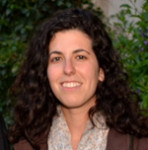By Anav Silverman

JERUSALEM (Tazpit) — The director of the Ein Afek Nature Reserve in northern Israel’s Acre Valley wetlands received international recognition recently for her efforts in restoring the man-made wetlands nature reserve. Giselle Hazzan, who is the first Arab woman to become a manger of a nature reserve in Israel, was awarded the Ramsar Wetland Conservation Award in June.
“We are really proud of this huge achievement, winning the Ramsar Award, which recognizes our many years of hard work,” said Hazzan. “Our team learned a lot through trial and error and we are continuing to learn.”
Since 2002, Hazzan has been working as manager of the Ein Afek Nature Reserve (EANR) and has changed the water management of the reserve for the better through effective management and by promoting new legislation and carefully planned long-term projects. Thanks to Hazzan’s regeneration and conservation efforts, the ecosystem of Ein Afek was transformed as a vital resource.
Hazzan was recognized at the 12th Conference of Parties of the Ramsar Convention, an international gathering which aims to conserve and make wise use of wetlands through international cooperation and through actions on a local and national level. The Convention defines wetlands on a broad scale and includes rivers, lakes, swamps, marshes, wet grasslands, mangroves, coral reefs, tidal flats, human-made sites like fish ponds, rice paddies, reservoirs, among others, in its criteria.
“The most successful part is to institute a system based on the wise use of the limited water resources, integrated with the local community, by planning for the long term for the local and national level,” said Hazan in the Ramsar Convention YouTube clip.
The Ramsar vision entails development and maintenance of an international network of wetlands which are vital for the conservation of global biological diversity and for sustaining human life. The award, which was established in 1996, has been given out five times since then. It is named after Ramsar, Iran where in 1971, the Convention was first adopted by 21 participating nations.
Israel ratified the Ramsar Convention in 1996 and has two sites on the Convention’s List of Wetlands of International Importance which include Ein Afek Nature Reserve and the Hula Valley Nature Reserve. The Israeli wetlands are among the 2,208 Ramsar wetland sites from across 169 countries around the world.
The Ein Afek Nature Reserve is the last remaining part of the Nahal Na’aman swamps in the Lower Galilee that were drained in the 1920s. In 1960, the state began pumping water for area residents by drilling from the Naaman Aquifer, a large drainage area containing groundwater. The source for the water was rainfall but because the state pumped more water than the rainfall the area received, the springs in the area dried up and vegetation was destroyed. In 1979, the area was declared a nature reserve and water pumping was limited.
Hazzan was a representative of Israel’s Nature and Parks Authority at the Conference of Parties of the Ramsar Convention held in Uruguay from June 1-9 according to the website of the Israel Ministry of Environmental Protection. There, she was recognized by the Convention Secretariat and Danone for her effective work in wetlands management.
“We are now replicating this model at other wetlands in Israel,” she said commenting on her work in the Ein Afek Nature Reserve.
*
Silverman is a staff writer for the Tazpit News Agency in Israel.